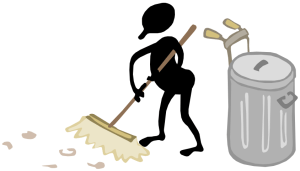We always find it interesting that consulting firms promulgate their own, unique operational definitions.
For instance, the term ‘values’ can be found called many things including “Guiding Principles”, “Tenets of Operation”, “Virtues”, “Essential Elements”, etc. Consequently, values provide answers that describe Who are We. — Benjamin Franklin called them virtues.
Generally, they all describe answers to the basic questions:
- “Who are we?”
- “What do we value?”
- “How do we make trade-offs?”
- “What do we carry with us?”
- “What weighs us down?”
- “How will we treat each other?”
- “How will we work together (in support of our mission)?”
Methods of Conducting Business
Similarly, for our purpose, values are narrative descriptions of policies and philosophies. They provide one- or two-sentence descriptions about the principles or internal rules, laws, policies, and philosophies of the business. They tend to describe who we are.
“Values are ideals that give significance to our lives, that are reflected through the priorities we choose, and that we act on consistently and repeatedly.”
—Brian Hall, PhD, Author of the Hall-Tonna Values Inventory
However, many personal values are rarely reflected in corporate standards, temperance or cleanliness as examples. Therefore, here are the truncated values of one of the 18th-century people who strongly influenced the nature of his country, before it became a country.
Mr. Benjamin Franklin’s Virtues
- TEMPERANCE: Eat not to dullness; drink not to elevation.
- SILENCE: Speak not but what may benefit others or yourself; avoid trifling conversation.
- ORDER: Let all your things have their places; let each part of your business have its time.
- RESOLUTION: Resolve to perform what you ought; perform without fail what you resolve.
- FRUGALITY: Make no expense but to do good to others or yourself; i.e., waste nothing.
- INDUSTRY: Lose no time; be always employed in something useful; cut off all unnecessary actions.
- SINCERITY: Use no hurtful deceit; think innocently and justly; and, if you speak, speak accordingly a method for progress.
- JUSTICE: Wrong none by doing injuries, or omitting the benefits that are your duty.
- MODERATION: Avoid extremes; forbear resenting injuries so much as you think they deserve.
- CLEANLINESS: Tolerate no uncleanliness in body, clothes, or habitation.
- TRANQUILLITY: Be not disturbed at trifles, or at accidents common or unavoidable.
- CHASTITY: Rarely use venery but for health or offspring, never to dullness, weakness, or the injury of your own or another’s peace or reputation.
- HUMILITY: Imitate Jesus and Socrates.
______
Don’t ruin your career by hosting bad meetings. Sign up for a workshop or send this to someone who should. MGRUSH workshops focus on meeting design and practice. Each person practices tools, methods, and activities every day during the week. Therefore, while some call this immersion, we call it the road to building high-value facilitation skills.
Our workshops also provide a superb way to earn up to 40 SEUs from the Scrum Alliance, 40 CDUs from IIBA, 40 Continuous Learning Points (CLPs) based on Federal Acquisition Certification Continuous Professional Learning Requirements using Training and Education activities, 40 Professional Development Units (PDUs) from SAVE International, as well as 4.0 CEUs for other professions. (See workshop and Reference Manual descriptions for details.)
Want a free 10-minute break timer? Sign up for our once-monthly newsletter HERE and receive a timer along with four other of our favorite facilitation tools, free.

Terrence Metz, president of MG RUSH Facilitation Training, was just 22-years-old and working as a Sales Engineer at Honeywell when he recognized a widespread problem—most meetings were ineffective and poorly led, wasting both time and company resources. However, he also observed meetings that worked. What set them apart? A well-prepared leader who structured the session to ensure participants contributed meaningfully and achieved clear outcomes.
Throughout his career, Metz, who earned an MBA from Kellogg (Northwestern University) experienced and also trained in various facilitation techniques. In 2004, he purchased MG RUSH where he shifted his focus toward improving established meeting designs and building a curriculum that would teach others how to lead, facilitate, and structure meetings that drive results. His expertise in training world-class facilitators led to the 2020 publication of Meetings That Get Results: A Guide to Building Better Meetings, a comprehensive resource on effectively building consensus.
Grounded in the principle that “nobody is smarter than everybody,” the book details the why, what, and how of building consensus when making decisions, planning, and solving problems. Along with a Participant’s Guide and supplemental workshops, it supports learning from foundational awareness to professional certification.
Metz’s first book, Change or Die: A Business Process Improvement Manual, tackled the challenges of process optimization. His upcoming book, Catalyst: Facilitating Innovation, focuses on meetings and workshops that don’t simply end when time runs out but conclude with actionable next steps and clear assignments—ensuring progress beyond discussions and ideas.




